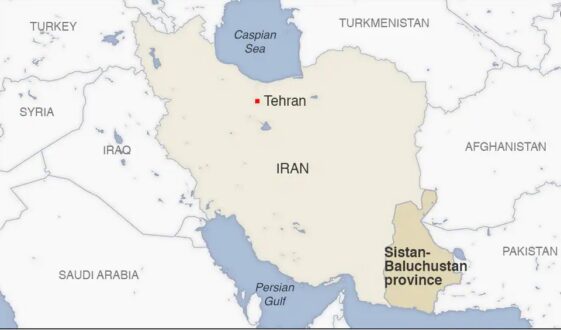RFL/RE – Pakistani warplanes launched air strikes early on January 18 on alleged militant targets in neighboring Iran, an attack that Tehran said left at least nine people dead, including four children and three women.
Iranian Interior Minister Ahmad Vahidi told reporters that none of the people killed were Iranian.
The strikes in Sistan-Baluchestan Province came after Iran’s Islamic Revolutionary Guards Corps (IRGC) attacked targets in Pakistan’s southwestern Balochistan Province on January 16, killing two children.
They also marked the first attack by another country on Iranian soil since the end of the 1980-88 Iran-Iraq War.
Pakistan’s Foreign Ministry said in a statement that the strikes targeted “terrorist” bases.
“This morning Pakistan undertook a series of highly coordinated and specifically targeted precision military strikes against terrorist hideouts in Sistan-Baluchistan Province of Iran. A number of terrorists were killed during the Intelligence-based operation codenamed Marg Bar Sarmachar,” the statement said.
In a very brief statement on Telegram, Iranian Foreign Ministry spokesman Nasser Kanani condemned the attack and said Pakistan’s charge d’affaires “was in the process of being summoned” to the ministry.
An official in Iran’s Sistan-Baluchistan Province told the conservative Mehr news agency that the strikes hit a border village and the victims were women and children.
“At 4:50 a.m., several explosions were heard in the area of Saravan city, and after investigations, we found out that Pakistan targeted one of Iran’s border villages with a missile,” Sistan-Baluchistan official Alireza Marhamati told Mehr.
In Beijing, a Foreign Ministry spokeswoman said China was ready to mediate between Iran and Pakistan.
“The Chinese side sincerely hopes that the two sides can exercise calm and restraint and avoid an escalation of tension,” Mao Ning said.
“We are also willing to play a constructive role in de-escalating the situation if both sides so wish,” she said.
A state television correspondent reporting from Sistan-Baluchistan said the Mirjaveh border crossing between the two countries was open, suggesting that the strikes had not impacted Iranian-Pakistani trade.
The retaliatory strike came hours after Islamabad recalled its ambassador from Iran in protest at the IRGC attack, and said that it “reserves the right to respond” to Iran’s “illegal attack.”SEE ALSO:Pakistan Recalls Ambassador After Iran’s ‘Unprovoked’ Attack Kills Two Children
The statement also said that Iran bears responsibility for the “consequences” of the attack.
The IRGC claimed that its January 16 strike targeted sites in Balochistan that were linked to the Sunni Baluch militant group Jaish al-Adl.
Following the IRGC strikes, Iranian Foreign Minister Hossein Amir-Abdollahian told his Pakistani counterpart on a call that Tehran “strongly respects” Islamabad’s territorial integrity and sovereignty and described Pakistan as a “brother.”
The porous, 900-kilometer-long border between Iran and Pakistan has proved difficult to control, allowing various militant groups, particularly those who harbor Baluch nationalist ideologies, to operate in the area.
On January 16, Iraq also recalled its envoy from Tehran after civilians were killed in an IRGC missile strike in Irbil in Iraq’s autonomous Kurdistan region. Iranian missiles also struck Idlib in Syria.
The IRGC said the attacks in Iraq and Syria had targeted “spy headquarters” and “terrorist” targets.
The exchange of strikes is likely to further strain relations between Iran and nuclear-armed Pakistan while also raising the prospect of wider conflict in the Middle East amid the ongoing war in Gaza between Israel and Hamas, which has been designated a terrorist organization by the United States and the European Union.
Iran has also been accused by the United States of sponsoring the Huthi rebels in Yemen.
The United States on January 16 condemned Iran’s attacks, and Britain urged Iran to stop supplying weapons to the Huthis.
“We’ve seen Iran violate the sovereign borders of three of its neighbors in just the past couple of days,” State Department spokesman Matthew Miller said.
British Foreign Secretary David Cameron said he urged Tehran to stop backing the Huthi rebels in a meeting with Iranian Foreign Minister Amir-Abdollahian.
“Iran must cease supplying the Huthis with weapons and intelligence and use its influence to stop Huthi attacks in the Red Sea,” said Cameron, who is attending the World Economic Forum in Davos, Switzerland.
“Iran must also stop using the regional situation as cover to act recklessly and violate others’ sovereignty. I made this clear to FM @Amirabdolahian,” he said on X, formerly Twitter.
 Shabtabnews In this dark night, I have lost my way – Arise from a corner, oh you the star of guidance.
Shabtabnews In this dark night, I have lost my way – Arise from a corner, oh you the star of guidance.



